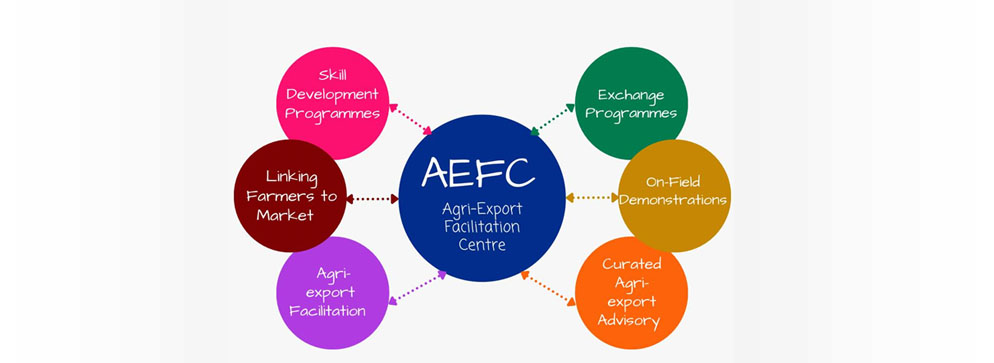The Agri Export Facilitation Centre (AEFC) is set up under the Farm Sector Development Department (FSDD) of the National Bank for Agriculture and Rural Development (NABARD) to be implemented by the South Asia Biotechnology Centre, Jodhpur, on 7 October 2022. NABARD AEFC is set up to create ‘one stop shop’ to discuss the potential of agriculture export, make a knowledge repository, develop export protocols, liaise with different export promotion bodies and enable FPOs, processors and exporters to navigate the complexity in agri export from Rajasthan. Recognizing that the state of Rajasthan offers tremendous opportunity in high value spices, millets, guar gum, edible oilseeds and aromatic and medicinal plants. AEFC tends to incubate potential agri- entrepreneurs, hand hold FPOs and agri exporters and facilitate business opportunities.
Moreover, AEFC provides a platform to deliver instant services and guidance on agri- export, train, mobilize and empower key stakeholders to harness the agriculture sector, develop capacities and address the need of agri-exporters, facilitate visits of experts and exchange program, facilitate participation in buyer-seller meets, and create interface with key stakeholders in agri-export sector for improving ecosystem of agri-export from Rajasthan.
The ultimate aim of AEFC is to act as a new gateway to boost the agri-export from Rajasthan and as a knowledge hub providing a platform for guidance and developing capacities among budding entrepreneurs.
The establishment of Agri Export Facilitation Centre at Jodhpur, Rajasthan provides an interface for key stakeholders including exporters, processors, aggregators, and farmers; host visitors including start-ups, self help group (SHG), farmer producer organization (FPO) and entrepreneurs, organize high impact field training programs to improve quality of farm produce and develop value chain partnership. NABARD AEFC has the-state-of-art infrastructure facility at Jodhpur which includes a working information kiosk with high-tech digital display and unified communication system, Wi-Fi enabled network and conferencing system enables both on and offline training programs on agri-export.
As an agri export curated program, NABARD AEFC contributes to quality production of high value crops, bridge upstream sector with downstream industry, organize buyer-seller interaction, community development and social transformation by organizing on-field demonstration, farmers’ field training programs in the major districts of Rajasthan. Field demonstrations provide technological information concerning all the aspects of production on farm as well as off farm to enable confidence in buyer-seller interaction and promote exposures of progressive farmers and FPOs.
Promoting GAP and IPM based production system enables farmers to learn the nuances of registration, certification, pesticide residue management and adoption of hygiene practices indispensable for meeting increasingly demanding sanitary and phytosanitary norms in international trade of agriculture produce.
Prioritization of crops specifically high value commercial crops such as spices including cumin, coriander, fenugreek, fennel, Nagauri paan methi, carom seeds; oilseed crops such as sesame, groundnut and mustard; aromatic and medicinal plants such as isabgol, sena and henna; fruits and vegetables, organic food products, cereals and pulses and processed food products. The centre is focusing on horizontal expansion of these crop commodities together sustaining the quality and meeting the International quality standards.

NABARD AEFC has been at forefront to field skill and empower smallholder farmers of Rajasthan, enabling implementation of world class GAP-IPM production system to reduce cost of cultivation, and produce pesticide residue free, harvest for domestic consumption and surpluses for export.
Since establishment, the grassroot efforts of AEFC is setting a benchmark in improving agricultural produce showing a visible impact in rising demand for high value crops and value added products including spices, medicinal and aromatic plants, edible oil and cluster bean etc which contributes a major proportion of export commodities from the region.
Notably, the farmers-scientists-industry interacting sessions held by the centre linking farmers, crop inputs stakeholders, supply chain facilitators, technical knowledge providers, Central and State Government departments and exporters have strongly influenced the crop production, harvesting methodology and post-harvest management of the grains by the farmers which would reflect an upsurge in the demand, in the years to come.